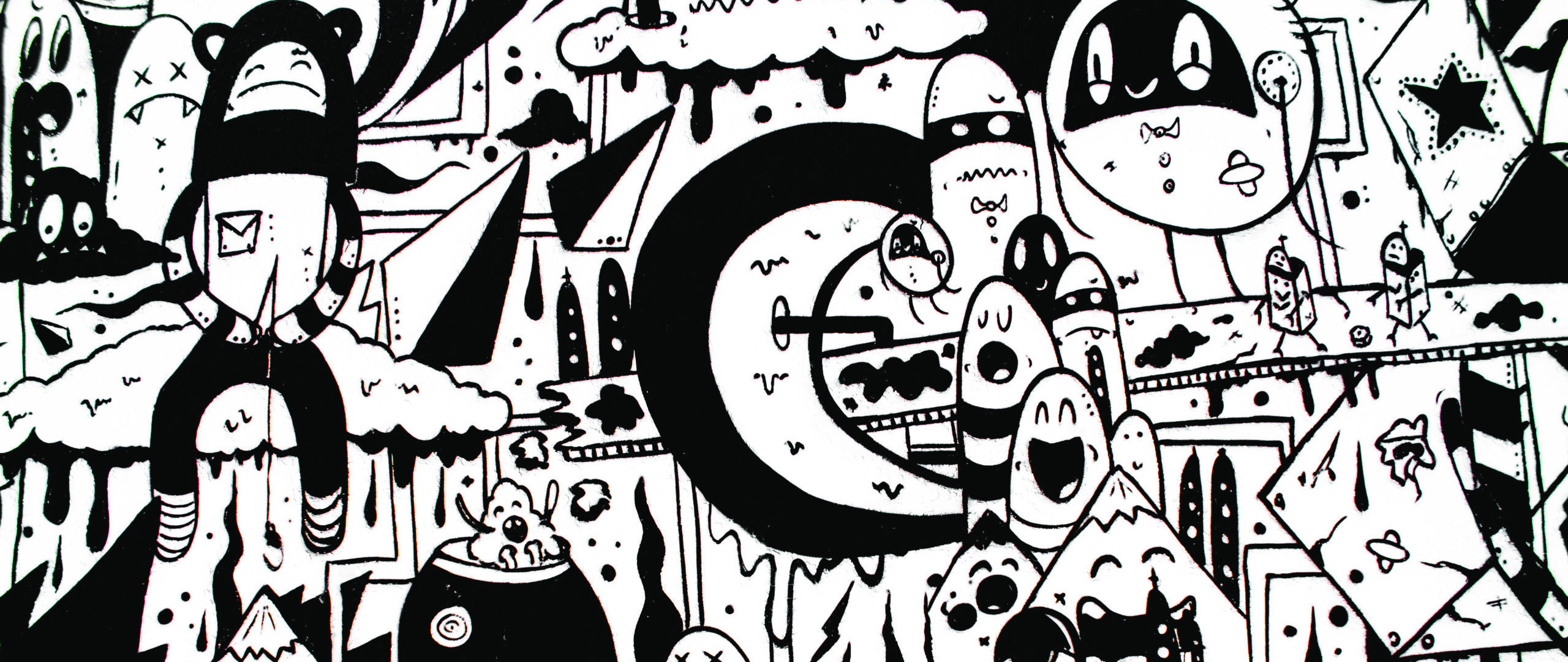When we play at being the self (when I run the experiment of being the self) then we are taking a position that is inherently insecure. That is our basis. To experiment at being the self is to experiment with being insecure – these are just two ways of saying the same thing. To be the self is to be fundamentally insecure. To be the self is to be always looking for what we need on the outside. Or as we could equivalently say, to be the self is not to have an inside.
This is the game of the self – to have nothing on the inside and to be always looking for everything on the outside. The only world we know is the world that is on the outside, which is to say, the world that is made up of our projections. This is what keeps us busy – we’re running around the whole time looking for ‘something on the outside’ to compensate for having ‘nothing on the inside’. It’s not about ‘making good’ the lack of anything inside either, it’s about continually having to be distracting ourselves from how bad that feels!
Being the self is ultimately an untenable situation, and yet we can postpone seeing this truth for a long, long time. We can postpone seeing the truth forever, it seems. It’s not just about having nothing on the inside (i.e. having no sense of our own interiority) – it’s the preposterousness of what we are pretending to be, the complete outrageous audacity of it. I’m claiming to be this quintessentially segregated (or as Alan Watts says, encapsulated) – and therefore disconnected – entity called ‘the self’; I’m seriously claiming to be this fictional personage and I’ll actually get upset if you say I’m not. It’s like having delusions of grandeur and thinking that I’m Napoleon – it just happens to be a collectively validated delusion, which means that we don’t spot it.
Being the self is a form of arrogance, when it comes down to it. It is actually a comedic situation (although the humour is lost on us); we are actually being totally ridiculous. It’s as if I am going around saying ‘I am The Man’ and taking myself very seriously indeed. I’m bluffing, but I’m falling for my own bluff. Because I’m bluffing there’s always this uncomfortable feeling (deep down where I’m not really aware of it) that I might be found out, that I might be revealed as a ridiculous fraud. What should I do about this uncomfortable feeling? I could buy a fine big Top Hat and go around with it on my head. I could buy the very best clothes that money can buy, and not just the best clothes but the best of everything, and generally ‘associate myself with greatness’ in whatever way I can. I could use the tried-and-tested tactic of ‘pushing the bluff even more’, in other words…
Another thing I could do in order to offset the uncomfortable feeling of being a fraud is to play the game known as society. Society gives each one of us a role, a status, a defined identity. Even if it’s not a particularly lofty status it’s still something, it’s still a status. So then, when society gives us a role, status, identity, then we don’t need to be worried about being caught out in my pretence anymore and what a great relief this is! Collective validation is a far greater force than just me claiming to be this, that or the other. It’s official – I’ve got my ID papers in my pocket and I can show them to you.
In this case, I really am the mayor, the postman, the teacher, the policeman, the criminal, the doctor of philosophy, and this no one can deny. Within the terms of the system that we have all bought into, this is categorically true! Straightaway therefore I am going to get a good feeling from this – the good feeling that comes from ‘knowing who I am’, and everyone else knowing it too. This also provides a motivational system because I can strive to ‘better myself’ within the terms of the social game I am playing – the higher my status, the more important the role, the greater the recognition the more my unacknowledged feeling of being a fraud or phoney will be compensated for. This doesn’t mean that the unpleasant feeling will ‘go away’, it just means that I will be better able to ignore the hidden messages of my unconscious as it is so strongly counterbalanced by the ‘overt affirmation of worth’ that society is providing me with.
Games work both ways however – like a sword, each side cuts equally well. What this means is that to the same extent a game can make us feel good by validating us if we play well, it can also make us feel correspondingly bad if we don’t. We always lose sight of this principle when we’re playing because we tend to look on the ‘positive side’ and picture ourselves as winners rather than losers. John Steinbeck’s celebrated quote, “Socialism never took root in America because the poor see themselves not as an exploited proletariat but as temporarily embarrassed millionaires” is true for everyone playing the social game – just as gambler routinely ignores the fact that the odds are in favour of the bookie, so too do we – as social game players – ignore the fact that only a very small minority are ever going to be accorded the high status that we aspire to. We play games hopefully in other words, which means that we focus on the prize rather than the pitfalls, the pros rather than the cons.
When we are playing the game of being this encapsulated self (and playing it along with millions upon millions of other people so that the key assumption gets very strongly reinforced) we can avoid perceiving the essential ontological insecurity that always comes with assuming this stance in life, at least on a temporary basis. But the pain that we are avoiding simply shows itself in a displaced format so that new terrors await us, new terrors that will cause us just as much pain (if not more) as the pain we were fleeing in the first place. The only difference is that we now deludely imagine ourselves to have the chance of escaping that pain once and for all if we play our cards right. This is how games work – positive and negative are separated and we gamble everything on being able to secure the former rather than incur the latter. This struggle takes place purely within the realm of fantasy however because plus and minus cannot be permanently pulled apart – it’s a condition of play that believe in this possibility, but it only is play that we’re talking about here. We can play that it’s possible to escape once and for all the pain that we’re fleeing from, and feel correspondingly good when we think that we have done so, but this good feeling only exists within the context of the game, and is always counterbalanced somewhere, by the ‘equal-and-opposite’ feeling.
We can’t escape from the essential insecurity of the self – we can only reformulate that insecurity in such a way that we apparently have a chance of doing so, if we ‘get lucky’. There is the believable appearance of escape from existential insecurity in other words, which is presented to us not as an escape from pain but as an actual good feeling (or positive virtue) in its own right – the good feeling or positive virtue of ‘being a winner’, which means being a ‘unconditionally-validated encapsulated self’, a ‘self-without-any-angst’. This is the illusion that we are all gunning for – the illusion of being a self that doesn’t feel in any way insecure! We have reformulated the original ontological insecurity (the insecurity of ‘do I exist?’) in terms of the closed (or gamified) insecurity of ‘will I win or will I lose?’ which is far more palatable to us because it offers us an out. ‘Neurosis is always a substitute for legitimate suffering’ as Jung says, and games are an essentially neurotic type of activity – games are neurosis because they are an attempt to avoid legitimate pain. We’re too afraid to see the truth and so we resort to self-deception.
The possibility of escaping the insecurity of being the self is a real one to us just as long as we play the game of being a self, which is to say, just as long as we play the game without allowing ourselves to see that the game is a game. And yet the ‘solution’ doesn’t work even within the narrow terms of the deal, when we look at it closely. It doesn’t work – even within its own terms – because whatever gains we make in the short term are always going to cancelled out by losses in the long term. If we look too closely at the game we can no longer ‘play hopefully’ and so we can’t play at all. Without hope of winning (or gaining an advantage that isn’t compensated for by an equal-and-opposite disadvantage somewhere else) there’s nothing to play for, clearly…
We can see this very clearly when we look at the game called ‘society’. Most of us are struggling to gain advantage within the terms of the system (society wouldn’t hold together otherwise) but what this means is inequality. All we can do is hope that we will find ourselves in the advantaged rather than the disadvantaged classes. In any game it is always true that I can only win if you lose, and vice versa, and this is also the case in the social game, the game of furthering oneself within society’s (necessarily arbitrary) terms. In this game, one person can only be raised up in the general esteem of others if another is cast down. This is an unpalatable truth most of us but it is a truth nonetheless – if we ‘look up’ to one person then we have we to look down on another! Every positive evaluation always has its negative counterpart – we can’t have ‘looking up’ without ‘looking down’, admiration without its negative, which is contempt or disdain. We only have to look at the lack of compassion we have for the disadvantaged sector of society to see this disdain, even though we will in all probability not admit it to ourselves. This fundamental ‘lack of compassion’ – or unkindness as we might also say – is a key feature of the capitalist way of life and it is becoming more pronounced all the time.
Society is a dirty game, in other words. It is a dirty game just as being the encapsulated (or narcissistic) self is a dirty game. How can we say that society isn’t a dirty game when one man’s advantage means another man’s disadvantage? Do I really want to feel good about myself if that means someone else feeling correspondingly bad? Will I not feel bad about feeling good, in this case? Am I in fact not cheating myself therefore by using this well-established strategy to avoid insecurity? Needless to say, very few of us do see things this way. If we do win status or recognition within the societal game then we very much tend to see this as legitimate – we see ourselves as deserving this validation. Of course we do – we have to buy into the game if we are to gain the illusion of benefiting from it. Those of us who – on the other hand – have been devalidated by the system, and have incurred a negative rather than positive identity, who have been ‘put down’ rather than ‘raised up’, may not see this as a legitimate state of affairs. We probably won’t! But the point is that it doesn’t matter what we think because we no longer have a voice. It’s only those who have been validated by the system that have a voice and they aren’t complaining!
Even within the narrow terms of the framework we are playing by this strategy doesn’t work out, therefore. Even if I get succeed in being validated by the social system this isn’t going to help me in the long run. It isn’t going to help me in any real sense. This is all about self-deception but self deception always rebounds on us in the end – the better I am at fooling myself the bigger and nastier the surprise is going to be when I finally see through it. So when I came up with an absolutely brilliant way of validating my false idea of who I am, an absolutely ‘foolproof’ way of making this seem real to me, is this really a case of ‘me doing myself a favour’? Is society doing me a favour by providing me with a ‘sure-and-certain identity’, a ‘cast-iron alibi’ in the face of existential doubt? Clearly not – I am simply setting myself up for a terrible shock when I am finally exposed to the truth, which as we all know on some level cannot be shut out forever. How can one hide from the truth, after all? An unwelcome truth has a way of persistently knocking on the door and this can become our greatest nightmare; he cleverer and more involved the lie, the more suffering there is in becoming aware of it.
We have a huge reluctance to seeing that things are never going to work out for the conditioned sense of self (which is the self that is forever running away, in an unconscious fashion, from the insecurity which is itself). The self can’t allow itself to hear this news. We have an absolutely monumental resistance to entertaining the possibility that whatever the self does it can never win out. There is no strategy that can work here, no answer to the problem of ontological insecurity. Actually, this isn’t just ‘monumental resistance’ that we’re talking about – it’s a lot more than that, it’s a way of life. It’s the very basis of conditioned existence. It is an absolute precondition of being the self that we can never allow ourselves to see the insecurity that is driving us. We cannot allow ourselves to see that there is no winning of this game, that there is no way for us to outrun the nemesis that is pursuing us so relentlessly. We can never allow ourselves to be aware of the true nature of our nemesis – the self cannot permit itself to directly see its own insecurity because being aware of the true nature of its insecurity is the same thing as seeing that it doesn’t exist. Consciousness is the end of the game, in other words.







John obrine
So what is the game we should be playing in life – in living, Nick?
Did I miss something? A recommendation from you or someone, hopefully, please?
Maybe you have an example or three of who you think is doing tbis thing called living right?
Nick Williams
That’s a great question though I don’t know how my answer is going to come across! What I would say is that no one is ‘living life right’ and they never could be – there is no ‘one’ there in the first place so how could they live it right? Your last point is like asking ‘name three people who are enlightened’- there are no enlightened people and there never could be. There never could be because when you ‘wake up’ your realize that there is no ‘you’! If I say that “John Smith is an enlightened being” this shows that I don’t really get what waking up means – it means that I realize that there is no ‘John Smith’ and that there never was. Or could be. I am liberated from the illusion of thinking that I am this person, this ‘self’. So then who is liberated? No one of course because there was no one there to be liberated, just as there was no one there to be not-liberated. There is a song by Robert Wyatt that expresses this better than I can – the link is https://www.youtube.com/watch?v=Fv_F29h_qxM
Nick Williams
The point is the the self’ is the most basic of our assumptions and as such we never question it. Who is going to question their most basic assumption? It’s our blind-spot because we can never look at it. We never think to. But when we’re happy – truly happy – we are happy because we have (momentarily) ‘forgotten to construct a self’. We’ve ‘forgotten ourselves’! Who was ever happy whilst at the same time remembering to be their idea of themselves? Happiness – I would argue – is when we let go of ourselves and that is why we are not happy that often. We’re not happy that often (as adults, at least) because we don’t WANT to let go of ourselves.